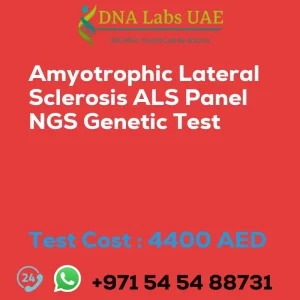Genetic Test for KPTN Gene Mental Retardation Autosomal Recessive Type 41
Welcome to DNA Labs UAE, where we offer a comprehensive genetic test for KPTN Gene Mental Retardation Autosomal Recessive Type 41. This test aims to analyze the KPTN gene for mutations associated with autosomal recessive type 41 mental retardation.
Test Details
The KPTN Gene Mental Retardation Autosomal Recessive Type 41 NGS Genetic Test is a genetic test that examines the DNA sequence of the KPTN gene. It utilizes Next Generation Sequencing (NGS) technology, allowing for the simultaneous analysis of multiple genes. This comprehensive assessment of genetic variations can help diagnose individuals with autosomal recessive type 41 mental retardation and provide valuable information for genetic counseling and treatment planning.
Test Components and Price
The cost of the KPTN Gene Mental Retardation Autosomal Recessive Type 41 Genetic Test is AED 4400.0. The sample condition required for this test includes blood, extracted DNA, or one drop of blood on an FTA card.
Report Delivery
The report for this test will be delivered within 3 to 4 weeks.
Test Type and Department
The KPTN Gene Mental Retardation Autosomal Recessive Type 41 Genetic Test falls under the category of Neurological Disorders. It is conducted by our experienced Neurologists in the Genetics department.
Pre Test Information
Prior to the test, it is important to provide the clinical history of the patient who is going for the KPTN Gene Mental Retardation Autosomal Recessive Type 41 NGS Genetic DNA Test. Additionally, a genetic counseling session will be conducted to draw a pedigree chart of family members affected by this condition.
Limitations and Recommendations
It is essential to note that this test specifically focuses on the KPTN gene and may not detect mutations in other genes that can cause similar symptoms. Furthermore, a negative test result does not completely rule out the possibility of having the condition, as there may be other genetic factors involved. We highly recommend consulting with a healthcare professional or genetic counselor to fully understand the implications and limitations of this test, as well as to discuss any potential risks and benefits.
| Test Name | KPTN Gene Mental retardation autosomal recessive type 41 Genetic Test |
|---|---|
| Components | |
| Price | 4400.0 AED |
| Sample Condition | Blood or Extracted DNA or One drop Blood on FTA Card o |
| Report Delivery | 3 to 4 Weeks |
| Method | NGS Technology |
| Test type | Neurological Disorders |
| Doctor | Neurologist |
| Test Department: | Genetics |
| Pre Test Information | Clinical History of Patient who is going for KPTN Gene Mental retardation, autosomal recessive type 41 NGS Genetic DNA Test A Genetic Counselling session to draw a pedigree chart of family members affected with KPTN Gene Mental retardation, autosomal recessive type 41 |
| Test Details |
KPTN Gene Mental retardation, autosomal recessive type 41 NGS Genetic Test is a genetic test that analyzes the KPTN gene for mutations associated with autosomal recessive type 41 mental retardation. This type of mental retardation is characterized by intellectual disability, delayed development, and other cognitive impairments. The test uses Next Generation Sequencing (NGS) technology to examine the DNA sequence of the KPTN gene. NGS allows for the simultaneous analysis of multiple genes, providing a comprehensive assessment of genetic variations. By identifying mutations in the KPTN gene, this test can help diagnose individuals with autosomal recessive type 41 mental retardation and provide valuable information for genetic counseling and treatment planning. It can also be used for carrier testing in individuals with a family history of the condition. It is important to note that this test specifically focuses on the KPTN gene and may not detect mutations in other genes that can cause similar symptoms. Additionally, a negative test result does not completely rule out the possibility of having the condition, as there may be other genetic factors involved. As with any genetic test, it is recommended to consult with a healthcare professional or genetic counselor to understand the implications and limitations of the test, as well as to discuss any potential risks and benefits. |








